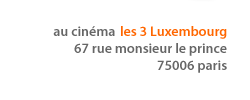
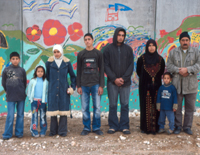
Screening date : 21-11-2007 -- 17h30
The Colour of Olives
Like many Palestinian families, the Amers live surrounded by the West Bank "Separation Wall". Their daily lives are dominated by electrified fences, locks and a constant swarm of armed soldiers. Through a sensitive lens we discover the private world of all eight members of the family.
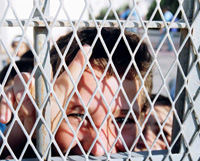
Screening date : 22-11-2007 -- 17h30
The Gates are Open Sometimes…
In Palestine roads and gates have a different meaning than anywhere else in the world. The film exposes the surreal nature of the daily life of ordinary people in the occupied West Bank.
What kind of roads and passageways do Palestinians have to cross in order to reach their schools, universities, fields, homes or olive groves?
What kind of roads and passageways do Palestinians have to cross in order to reach their schools, universities, fields, homes or olive groves?
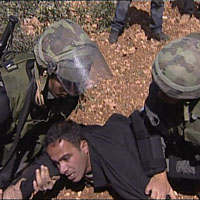
Screening date : 21-11-2007 -- 20h30
The Iron Wall
In 1923 Vladimir Jabotinsky, leading intellectual of the Zionist movement and father of the right wing of that movement, wrote…
"Zionist colonization must either stop, or else proceed regardless of the native population. Which means that it can proceed and develop only under the protection of a power that is independent of the native population – behind an IRON WALL, which the native population cannot breach."
From that day these words became the official unspoken policy of the Zionist movement and later the state of Israel. Settlements were used from the beginning to create a Zionist foothold in Palestine.
"Zionist colonization must either stop, or else proceed regardless of the native population. Which means that it can proceed and develop only under the protection of a power that is independent of the native population – behind an IRON WALL, which the native population cannot breach."
From that day these words became the official unspoken policy of the Zionist movement and later the state of Israel. Settlements were used from the beginning to create a Zionist foothold in Palestine.
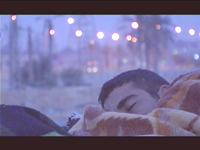
Screening date : 27-11-2007 -- 15h45
The Market Boys
This is a story about pre-mature adulthood and the fight for survival of a 17 year old Palestinian boy who works for Jews in an Israeli marketplace. Nidal works to support his family and to cover the medical expenses of his sister who has leukaemia. Nidal acts like a tough man who has taken upon himself the responsibility of supporting his family.
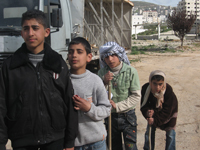
Screening date : 21-11-2007 -- 15h30
The Pain of Breath
An ordinary day at a check point near Nablus. The soldiers take turns questioning and pestering the Palestinian families who attempt to go through. Humiliation after humiliation pile up…

